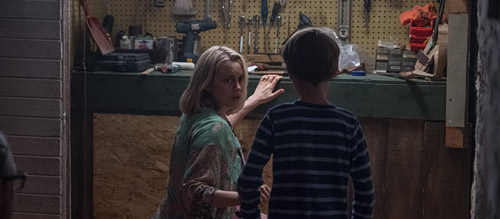The Prodigy (2019) Review
The Prodigy (2019)
Director: Nicholas McCarthy
Screenwriter: Jeff Buhler
Starring: Taylor Schilling, Jackson Robert Scott, Peter Mooney
The horror genre loves a good creepy child to base its plots around, and The Prodigy by Nicholas McCarthy is no different.
The Prodigy is an American-Canadian horror/thriller that centers around a young, intelligent boy named Miles (Jackson Robert Scott) growing up in schools for the gifted. Like most children, he finds it hard to initially fit in, and he develops concern in his mother Sarah (Taylor Schilling) when he starts to display erratic and aggressive behaviour, including talking in his sleep. After a meeting with some experts, Sarah realises there is a much darker side to her son than she first thought, and it transpires that she must now save him from an unseen darkness inside…
The possessed child narrative is a familiar one to horror movie fans, with many films centering around this plot, including some of the horror genre’s most famous – The Exorcist, The Possession, The Conjuring an Insidious, to name but a few. The Prodigy, however, is a slower burn compared to many of its famous brethren, asking you to witness increasingly unusual, creepy and eventually sinister behaviour as you watch the child grow up. Here, the possessed child attacks class members, threatens adults and even commits murder.
Director Nicholas McCarthy has had moderate successes within the horror genre before, with films such as The Pact (2012) and At the Devil’s Door (2014), but has gained a lot of traction for The Prodigy, which earned over three times its production budget at the box office, with an impressive return of $21million worldwide. His focus here is wholly modern in that it seems to be solely on the plot, rather than offering the attraction of star names, with ‘Orange Is the New Black’ alum Taylor Schilling being the biggest draw.
The casting in this film is, overall, exceptionally done. Schilling no doubt attracted something of a following for The Prodigy given the popularity of her Netflix show, but she seems to have been selected for the quality of performance she can offer rather than any financial reason. Here, she plays the terrified mother, becoming increasingly paranoid and scared of the child she is sworn to protect. It’s a staple of the possessed child sub-genre to have such a powerful performance in the role of the mother, and her performance certainly helps to accentuate the deeply uncomfortable feeling that permeates every scene involving the young boy. Similarly, Jackson Robert Scott (It) is wholly impressive as the seemingly innocent doe-eyed child, the way he plays off Schilling offering not only a believably strong mother-son dynamic, but also an inherent threat that escalates the narrative’s tension. Representing the detached viewpoint of the audience is Peter Mooney as the distrustful absent father figure, his character seeing the events as we do and echoing our sentiments in a role more important in establishing our entry point to the narrative than providing an exceptional performance.
The cinematography in The Prodigy is one of the film’s most noteworthy aspects, the position of the camera really hammering home the ‘split personality’ of Miles with many a shot where half of his face will be cloaked in darkness or out of frame. One of the most impressive shots in the film shows Miles from his bedroom, his shadow seeming to unnaturally elongate, insinuating an unnatural malice permeating from his inner self. The film gets progressively darker too, emphasising the darkening of the family’s situation as the narrative continues to its crescendo, some of the latter scenes blanketed in a threatening and unknowable blackness.
Sound is also a valuable asset to The Prodigy, if a little typical of horrors of its type. It doesn’t take the film places it isn’t already heading, but it effectively expands on feelings of bliss, of anticipation and of terror when required, working alongside some exceptional sound mixing (which sees Miles’ innocent tones juxtaposed with the deeper sound of the score) to reinforce the feelings of unease that provide the thrilling backbone of the film.
Generally, “possession films” are so popular these days that it is hard to stand out, and The Prodigy’s narrative does not stand out spectacularly among any number of much larger films with better explained themes and ideologies. While it does successfully formulate an unsettling tone, The Prodigy also fails to ever be outright scary, and isn’t fresh or inventive enough to be included amongst the very best of the genre. It’s a horror film that sticks to the formula, all the while ignoring important questions about side characters, begging the question of why any of them were even included in the first place, and while some scenes offer great shock value, these same scenes offer little else to the overall plot or journeys of the characters.
Overall, The Prodigy is a good horror film. It does venture into newer territory and deal with topics that aren’t necessarily as typical as some of its elements, and films such as this can be very difficult to get right, but McCarthy’s largest box office hit to date does enough to satisfy those interested by its premise or cast. So long as you don’t go into the film expecting to be hiding behind a pillow throughout, there is much to enjoy with this 2019 films; those expecting a tense thriller about an evil child not likely to be disappointed.
15/24


